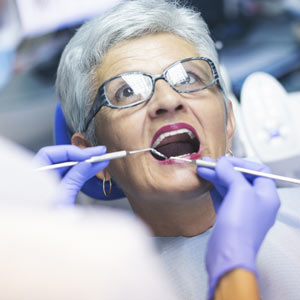September is National Gum Care Month, an ideal time to talk about how to keep your gums healthy. Unfortunately, nearly half of adults have gum disease, which can damage the soft tissue and bone supporting the teeth. In fact, advanced gum disease is the number one reason for tooth loss among adults, and it’s associated with other health problems, including cardiovascular disease, diabetes and pregnancy complications. But there’s good news—gum disease is preventable and, in its early stages, even reversible. Here are some tips for taking care of your gums:Keep up a good oral hygiene routineGum disease begins with plaque buildup, so attack the plaque in your mouth with good dental hygiene. Spend two minutes morning and night brushing all surfaces of your teeth, and floss once a day to get rid of plaque that forms between teeth. Use a soft toothbrushThe American Dental Association recommends brushing gently with a soft toothbrush. Hard bristles can damage your gums and cause them to pull away from the teeth. Swish with a mouth rinseConsider using a mouth rinse. Over-the-counter and prescription oral rinses are available to help wash away food debris, reduce plaque and fight gum inflammation. Say no to tobacco Smoking is one of the biggest risk factors for developing gum disease. And it’s not just cigarettes but all forms of tobacco, including e-cigarettes, pipes and chewing tobacco, that raise your risk of gum disease. Eat a healthy dietFor the best gum health, avoid refined carbohydrates (sugary and starchy foods) and make sure you are getting enough vitamin C, vitamin D and antioxidants (found in berries and green tea, for example). In addition, studies suggest that a diet rich in omega-3 fatty acids may reduce your risk of gum disease and other inflammatory conditions. These healthy fats are found in many fish, nuts, seeds, soy products and vegetable oils.Come in for regular cleaningsProfessional dental cleanings can remove plaque from the tiny spaces that are difficult to reach by simply brushing and flossing. And once plaque hardens to form calculus (tartar), it cannot be removed during your regular oral health care routine at home. Further, at the dental office we can detect gum disease in its early stages—and the earlier gum problems are caught, the more easily they can be reversed.Taking care of your gums will help you put your best smile forward now and in the future. If you have questions about gum health, call the office or schedule a consultation.
Recent Posts
- The Importance of Emergency Dental Care: Timely Intervention is Key
- Delaying Wisdom Teeth Extraction Can Lead to Serious Issues
- Can an Abscessed Tooth Kill You? Symptoms and When to Seek Urgent Care
- How to Recognize and Effectively Treat a Dental Emergency
- Gum Disease and Heart Disease: Understanding the Connection

